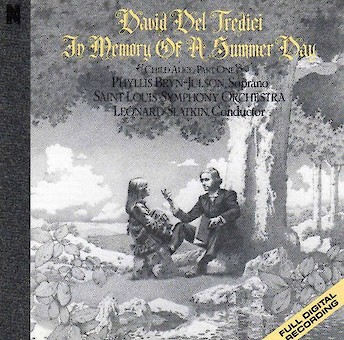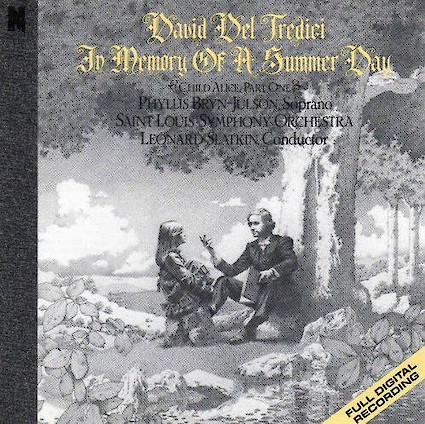Child Alice complete recording by BMOP
11/15/2017
In Memory of a Summer Day begins with an 'Introduction' with (perhaps) suggests dawn, the freshness of early day-time, before the trip on the Thames. It includes a Cadenza for the soprano.
The setting of the poem in 'Simple Alice' as the title implies, is meant to suggest a childlike innocence, the fresh, unspoiled charm of youth ? poetry as understood by a child (verses 1-3). Only in the fourth verse, where Carroll clearly interjects a pensive, almost bitterly sad note, does the tone change. After a long interlude, the happy mood returns (verses 1-3) in a varied repeat) and verses 5-6 bring the setting to quiet close.
'A Tale Is Told: Triumphant Alice' is an elaborate, extensive March. Like many of my pieces, this movement begins chastely, but grew (Wonderland-style) to alarming proportions. As a boisterous scherzo is to a courtly minuet, so might my ? well ? Super-March seem to more familiar specimens of the genre! Rather than the usual military associations, the piece suggests to me the brightness of mid-day with certainly a blazing sun overhead reflecting dazzlingly, blindingly off the water's surface.
'Interlude' grows out of the March's (surprisingly) quiet ending, and includes an altered recapitulation of music from the introduction.
'Ecstatic Alice,' which follows, is Carroll's dream, a dream of love. It is a second setting of the poem, colored entirely by this infatuation. What he could not express ? perhaps even feel ? waking is now given full, romantic vein. The key change, too, is significant. Both 'Simple Alice' and the Marcia were in A Major. Here suddenly the key goes up a half-step to B-flat Major, a release from the earth-bound A!
'Ecstatic Alice' is an Aria in the grandest sense of the word; beginning with another version of the 'Simple Alice' melody, it soars eventually to a Liebestod-like climax, subsiding then into quietude.
In the complete performance of Child Alice Part I comes to a surprisingly abrupt conclusion and is followed by an intermission. For a separate performance of In Memory of a Summer Day I have written a concert ending.
There is an element of the circus in the Alice in Wonderland pieces by David Del Tredici, of the dazzling, improbable trick — listening to one of them is like watching an elephant walk a tightrope and turn a pirouette at the end. And the element of improbability is one thing that an audience invariably responds to; there is something quite literally unbelievable about listening to what Del Tredici can do to a simple tune with a giant orchestra, amplified soloist, and assorted toys like anvil, a wind machine, and a siren — and an hour at his disposal. And even as you listen to this improbable thing, you respond with a wide, circus smile.
while the circusy aspect of the disparity between ends and means is certainly part of its appeal, there is also in this same disparity a profoundly original musical realization of the perpetual fascination there is in the interplay of innocence and experience in the Alice books; Del Tredici brings to the nursery-rhyme simplicities of his melodic material all of the harmonic and orchestrational resources of Wagner's Venusberg.
The full effect of In Memory of a Summer Day can only be assessed when Child Alice is performed complete. On the other hand some of it makes you laugh out loud; some of it is of a quite rapt beauty; and the piece as a whole leaves just the right effect of troubled exuberance. The audience gave it a standing ovation.
The Pulitzer Prize doesn't have a particularly impressive record in recognizing modern masterpieces. This year, however, matters may — just may — be different.
The winner was David Del Tredici, a composer of enormous energy and dramatic flair and originality and daring. The daring comes from the fact that he happens — just happens — to write new music that sustains more than a flirtation with old-fashioned tonality...
...just about as lavish as music can possibly get. ['Ecstatic Alice'] is almost all peaks and no valleys — like Wagner at his most climactic, Mahler at his mostself-indulgent, Strauss at his most erotic, and Elgar at his most pompous. And all at once.
Del Tredici shamelessly, nay proudly, uses hundreds of clichés from 19th-century music, everything from a wind machine to cornball Victorian melodies. He makes no pretense of plunging emotional depths but aims, instead, straight for the aural erogenous zones. How well he succeeds could be easily determined from the sophisticated audience happily abuzz at intermission.
The audience received it warmly, with many listeners on their feet to applaud. In Memory of a Summer Day is a skillfully made, ingratiating work.
The resemblances to Final Alice, heard here two seasons ago, are as clear and unabashed as Del Tredici's devotion to Alice in Wonderland as a literary theme. Both works use a large orchestra with a soprano soloist. Each is built on a simple, hummable triadic melody; both melodies start with a rising major sixth, proceed by sequences, and are varied in ways that the ear can easily follow. Both works last a little more than an hour.
In Final Alice, the composer repeatedly made his melody disintegrate in Ivesian collisions, and in these episodes of conflict the soprano sang through an electric megaphone that itself was amplified through a public-address system. Summer Day has a different structure — essentially, two long arias separated at about midpoint in the piece by a big, elaborate march.
The first song, 'Simple Alice,' is rhapsodic. The second, 'Ecstatic Alice,' accumulates in grand chromatic spirals whose reminiscences of Wagner's 'Tristan' love duet and Liebestod are acknowledgement by Del Tredici.
The march is a colossus that one could hardly appreciate without hearing it 'live' in a well-regulated performance such as Slatkin conducted. Its colors are deployed as lavishly as Rimsky-Korskov's in 'Scheherezade.' Its sonorities are as huge in vertical mass as they are broad in spectrum. A siren joins the ensemble for several pages that Del Tredici justly noted in his score as the 'climax of climaxes.'
Summer Day is unmistakably a musical experience. Its materials are simple but they are cleverly and engagingly handled. There is a cheerful, brash individuality about Del Tredici's work that is appealing, even when it underlines itself with the punning 'signature' at the end — a chanted count up to 13, which in Italian is 'tredici.'

11/15/2017

5/13/2016



Awarded the Pulitzer Prize in Music